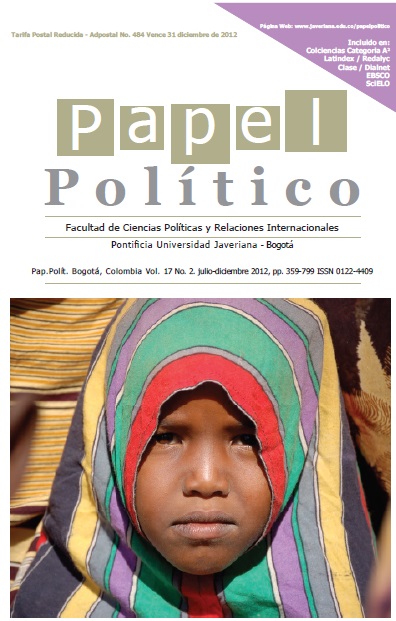Resumo
En las últimas décadas, la mayoría de países con sistemas políticos democráticos han asistido a un resurgimiento de la sociedad civil como actor
político, lo cual es evidente al analizar el ciclo de las políticas públicas. Allí, se le ve como un actor dinámico, propositivo y participativo, con deseos de involucrarse en la elaboración de la agenda, en la formulación de políticas, la ejecución de programas y la evaluación de los resultados. Este artículo hace un recorrido histórico por la evolución de la participación de la sociedad civil en la
toma de decisiones públicas. También, muestra las dificultades conceptuales y metodológicas de trabajar la sociedad civil como actor, analiza la participación e incidencia en el ciclo de las políticas y hace recomendaciones institucionales
y organizacionales para el fortalecimiento de la sociedad civil como actor del ciclo de las políticas públicas.
Esta revista científica se encuentra registrada bajo la licencia Creative Commons Reconocimiento 4.0 Internacional. Por lo tanto, esta obra se puede reproducir, distribuir y comunicar públicamente en formato digital, siempre que se reconozca el nombre de los autores y a la Pontificia Universidad Javeriana. Se permite citar, adaptar, transformar, autoarchivar, republicar y crear a partir del material, para cualquier finalidad (incluso comercial), siempre que se reconozca adecuadamente la autoría, se proporcione un enlace a la obra original y se indique si se han realizado cambios. La Pontificia Universidad Javeriana no retiene los derechos sobre las obras publicadas y los contenidos son responsabilidad exclusiva de los autores, quienes conservan sus derechos morales, intelectuales, de privacidad y publicidad.
El aval sobre la intervención de la obra (revisión, corrección de estilo, traducción, diagramación) y su posterior divulgación se otorga mediante una licencia de uso y no a través de una cesión de derechos, lo que representa que la revista y la Pontificia Universidad Javeriana se eximen de cualquier responsabilidad que se pueda derivar de una mala práctica ética por parte de los autores. En consecuencia de la protección brindada por la licencia de uso, la revista no se encuentra en la obligación de publicar retractaciones o modificar la información ya publicada, a no ser que la errata surja del proceso de gestión editorial. La publicación de contenidos en esta revista no representa regalías para los contribuyentes.


